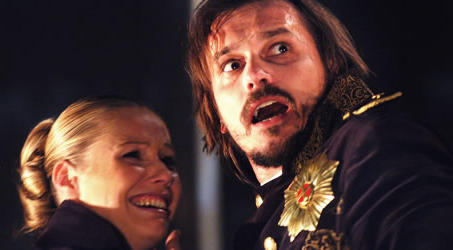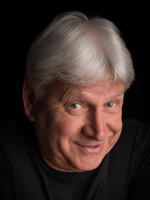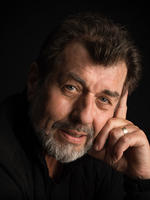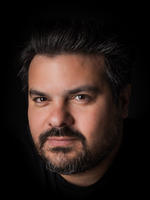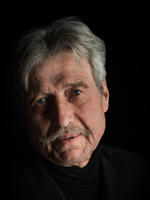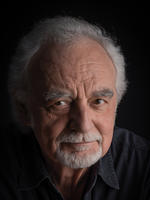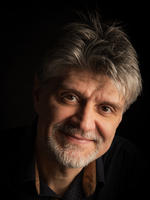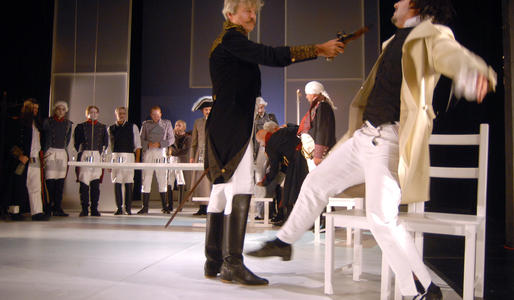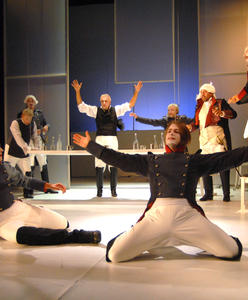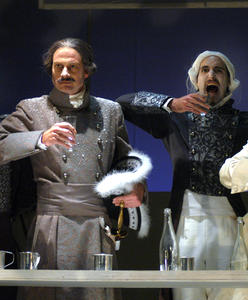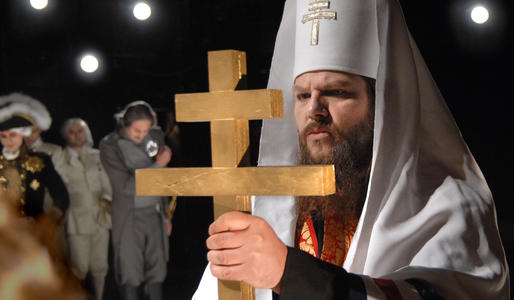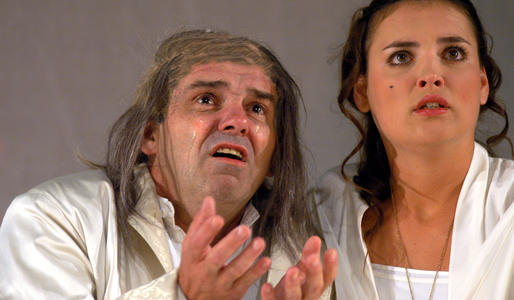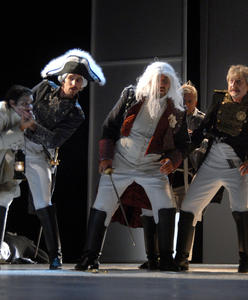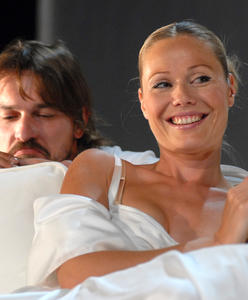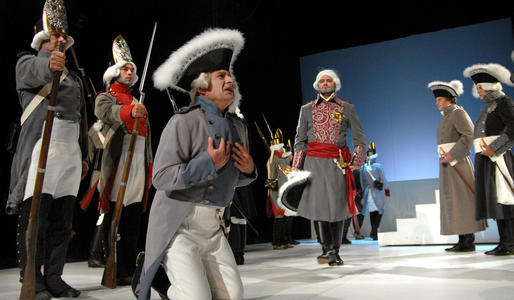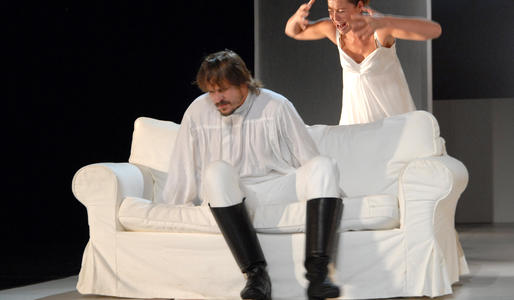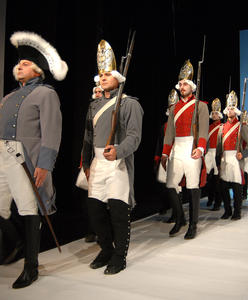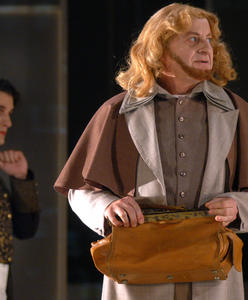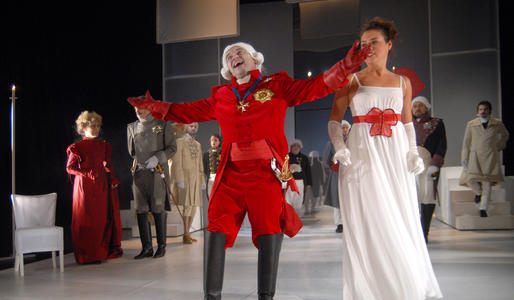Plzeň applauded...
Kateřina Kočičková 15. September 2008 zdroj MF Dnes
The Plzeň (Pilsen) audience likes Czech theatre the most and in this respect, the festival had a lot to offer: foreign reviewers were invited to the performances and the show aimed to offer a representative cross-section through the domestic theatrical scene. Right at the beginning the festival served The Death of Paul I by Brno City Theatre with the excellent performance of Erik Pardus in the role of a tsar/dictator, a man of many faces - a tyrant who gives cruel punishment for wrongly buttoned-up uniforms, a buffoonish joker as well as a gentle and poetic lover.
Grand and impressive start
Viktor Viktora 13. September 2008 zdroj Plzeňský deník
The Theatre 2008 international festival offered fascinating productions from Serbia and also from Brno. The sixteenth year of the festival in Pilsen announced itself in a way that was both evocative and most impressive - the Belgrade theatre Atelje 212 and the Brno City Theatre took care of that.
Dmitri Sergeevich Merezhkovsky (1866-1941) was one of the creators of Russian symbolism. With exactness of historical as well as psychological detail, he avoided conjecture and suppositions in The Death of Paul I. and created a thrilling panorama. With no less perfect invention, modern feeling and appreciation for the text, Hana Burešová took the directorial helm of the drama. She managed to keep the intense attention of the audience for three hours as the drama graduated towards the final triumphal applause.
Brno City Theatre has a large drama ensemble (we can be only envious in Plzeň) which is absolutely sovereign in its acting. The frightful way in which the paranoid tsar exercised his powers and judgment mingles with moving periods when the tsar is very human and full of feelings. This, along with the conspiracy and murder composed the monumental horizon on which the great Erik Pardus (who obtained the Thalia Award for the character of Paul), the correct and inexorable director of events Igor Ondříček (the governor of St. Petersburg, Pahlen) and Petr Štěpán, full of fear of his father and of power (the successor to the throne Alexander), all excelled.
Theatre Plzeň opened with the impressive Death
Jiří P. Kříž 11. September 2008 zdroj Právo
In western Bohemia, the sixteenth international festival started on Wednesday devoted to the south of Europe
The sixteenth international festival Theatre Plzeň (Pilsen), which was launched ceremoniously in the chamber theatre of J.K.Tyl on Wednesday evening with the participation of representatives of the region and town, theatrologists, reviewers and guests from abroad, set out for warmer climes this year.
In the programme theatre ensembles from southern Europe prevail, hailing from Croatia, Italy, Slovenia and Serbia. Zagrebačko kazaliště mladih, Theatre Atelje 212 Beograd, Serbian Johan and Czech Mamapapa actually already introduced themselves yesterday before the beginning of the show.
Bravo for Pardus
The highlight of the first day was a true event - the performance of Merezhkovsky's The Death of Paul I directed by Hana Burešová and staged by Brno City Theatre. Burešová and the dramaturgist Štěpán Otčenášek returned Dmitri Merezhkovsky, who wasn't known until recently even to those who took Russian as a subject at their school-leaving exam, to the Czech stage.
Instead of a bunch of superlatives, here is a list of the awards: the Alfréd Radok Award for the best performance of the year in 2007, and the same award for Vladimír Franz for the best music and for Erik Pardus in the title role for the best male acting performance. The exceptionality of Pardus' creation was confirmed also by his Thalia Award from the Actors' Association.
Merezhkovsky's 'Death' was performed in Czechoslovakia for the first and last time in the nineteen twenties. The author fled from Russia due to the Bolshevik revolution and died in Paris in 1941. The 'Death of Paul I' is a dramatic tale: a bit of a detective story, a bit of thought about the controversial era of autocracy at the end of the 18th century.
The collector of Radoks - master of music Franz - has given colour to the performance with orthodox liturgical harmonies, but also with dark tones almost reminiscent of the horror genre.
Erik Pardus puts on a disciplined, exact and impressive performance in the title role, managing transformations and shifts from a cruel ruler who requires military discipline to a self-confident but ageing husband and lover and finally to a poor wretch being chased by conspirators who are ludicrously infected by let's say the French revolution…
The Death of Paul I in Brno - another top quality performance
Josef Mlejnek 16. January 2008 zdroj virtually.cz
Brno City Theatre got lucky several years ago when it chose to cooperate with the dramaturgist Štěpán Otčenášek and the director Hana Burešová. After many successful productions ((Kamenný most aneb Prostopášník - The Stone Guest, Znamení kříže - Devotion to the Cross and others), both these artistic pillars of the Divadlo v Dlouhé Theatre in Prague are demonstrating their skills once again in the production of a drama by the Russian writer Dmitri Sergeyevich Merezhkovsky, The Death of Paul I.
In a way, they have connected this production with the performance Images of the French Revolution which had its premiere at their theatre seven years ago. However, that play was more of an encyclopaedic overview which culminated in the murderous "absolute rule" of Rousseau's general will, via, how else, individuals who were especially adapted to this purpose, whilst the tragic individual story of this Russian ruler from the unsettled period at the turn of the nineteenth century characterizes 'the autocrat' in its whole Russian particularity. Paul I Romanov is usually seen as a negative figure and an eccentric who openly hated his mother Catherine the Great and, after his accession to the throne, made it law that a woman may become the Tsarina only in the case that no men are at hand who are genealogically close or even distant. He suppressed constitutional elements, but on the other hand, shortened corvée on his land by one whole day. The Polish see Paul I in a more positive light: he freed their national hero, Kosciuszko, from prison, and he also considered himself, probably mistakenly, to be a son of the last Polish king Stanislaw August Poniatowski. Also, the ruler’s death will remain a matter of conjecture; his son and successor to the throne, Alexander, may have had an active share in it. Merezhkovsky steers clear in his drama of suggesting the active participation of the young Tsarevich in the murder.
Brno’s performance has accentuated the strange, almost mad elements of the tsar’s character. Erik Pardus in the main role embodies a deranged, mad and bipolar person who is strongly reminiscent of the Roman emperor Caligula. He gets mad over a tiny matter and has the commander of the guard whipped to death, while in contrast, he confides in the manner of a helpless child in his lover Anna, Princess Gagarina (Evelína Jirková) in lyrical sorrowful outbursts. The character of Paul is very convincing even just before his death: is it the heroism of an obsessed person or histrionic prose? It is both elements, inseparably intertwined in the rich, image-laden story of his fate. The young Tsarevich Alexander (Petr Štěpán) enjoys Rousseau's writings, which he has found among the books left to him by his grandmother. In France, the loner's ideas have already transformed into their opposite, but in Russia they have been waiting for their opportunity to take root for more than a hundred years. At that moment, they have just got their foot in the door amongst the elite - this can be seen clearly in the discussions of the company at the tsar's court. "Granny" Catherine had been friends with the great Voltaire but on the other hand, without blinking an eye, had had about 80 000 Roman Catholic "uniates" deported to Siberia. The aristocrats, who care about the fate of Russia but still more about their own welfare, want to get rid of Paul. All aristocrats are dwarfed and mostly even successfully manipulated by Count Pahlen, the main deviser of the conspiracy. Igor Ondříček has created a character equal in stature to that of the Tsar, even as far as his acting goes. His Prussian fish-like coldness is combined with a strange smartness, exactness, a sober pragmatism in his judgement, and with the passion of a player. He convinces even the Tsar that he has made himself leader of the conspiracy in order to save him… The stage only seems to be static: the hanging "Mondrianic" panels (mainly white, one is green to represent the dignity of power, one is red for moments when blood is shed) form a counterpoint not only to explosive scenes which culminate in the murder of the Tsar but also to Vladimír Franz's dynamic music. The only obstacle to the thrilling flow of action is the somewhat unsmooth academic translation. Every now and then the director of Brno City Theatre, Stanislav Moša, is criticised bitterly for being commercial and focusing only on the pursuit of success with the audience. Even though his adversaries have to acknowledge Moša's managerial skills, grudgingly, they continually try to bring him down in other ways. I saw a totally non-commercial and artistically excellent performance of The Death of Paul I as the tenth or eleventh repeat. I saw a theatre that was sold out and applause at the end that many theatres can only dream of during their premieres. So where is the non-profit making mistake?
A parable about the instability of power
Vít Závodský 10. December 2007 zdroj Týdeník Rozhlas
We can sometimes hear about a theatre which inclines towards commercialism when people speak about the three-ensemble Brno City Theatre. It is true that their repertoire presents musical performances which are probably sought after the most by the audience. These are cultivated here systematically - be they titles taken from abroad (Oliver!, The Witches of Eastwick, Fame) or original productions (Svět plný andělů - A World Full of Angels, Koločava, Nana). A no less important aspect of the range of performances the theatre offers is, however, their dramatic work, for example the first Czech staging of Mitterer's drama In the Lion's Den (the Prague performance of this play is discussed in TR 50/2007).
As a matter of fact, Brno City Theatre have begun seasons several times with performances by the Prague director Hana Burešová (Kamenný host - The Stone Guest, Znamení kříže - Devotion to the Cross, Amphitryon; these productions mostly received important rewards). The historical drama by Dmitri Sergeyevich Merezhkovsky The Death of Paul I is a similar case. It appeared after World War I, but only in Pilsen and then in the "golden chapel". Brno has appropriately expanded on these previous views into the Russian classical heritage. The original was newly adapted by a Brno university professor, Danuše Kšicová, and her exceptionally thorough adaptation received dramaturgical contributions from Štěpán Otčenášek, Pavel Klein and Jiří Záviš.
Merezhkovsky, a symbolist, poet and prose writer whose works have been published frequently in the Czech Republic, spent some time as an emigrant in France, where his extensive, multi-layered tragedy was created as the first part of a loose trilogy, in the oppressive atmosphere after the defeat of the revolution in 1905. With the help of his knowledge of history, the author captured several spring days in 1801 when the volatile descendant of Catherine the Great, Paul I, was deposed by aristocratic conspirators and killed in his St. Petersburg palace, to be immediately replaced by his son, Alexander I, who was later a participant in the Napoleonic wars. The director has partially reduced - maybe still by too little - the richly over-peopled play.
The three-hour long evening with its painstaking reconstructions of eight acts is not exactly easy on the concentration of the spectators. The vertically-structured and plain stage by Tomáš Rusín meets the producer's intentions. Merezhkovsky's inventive principle of contrast and ambivalent figures and situations accentuate the non-definite genre of the production, in which a great role is played by the instrumental and vocal music by Vladimír Franz, which stresses the drama in the action on stage, together with the period costumes by Zuzana Štefuňková, whose work with colours as bearers of meanings and emotions is well thought out.
As for the court intrigues, the director stresses their timeless validity. The oppressive atmosphere of all-absorbing fear - which is typical of all dictatorial regimes - radiates both from the chilling ensemble sequences and from the main figure of the ruler. Erik Pardus in the role of his life (in reliable harmony with the players of other roles, for example Igor Ondříček, Petr Štěpán, Irena Konvalinová, Pavla Ptáčková and Evelína Jirková) captures the inscrutability of the paranoid despot, a provocative clown as well as a dreamer in love.
A timeless look at the cruelty of absolute power
Vít Závodský 15. November 2007 zdroj Kam
This wide-ranging, many-layered tragedy, reflecting the suffocating atmosphere present after the failure of the Russian revolution in 1905, brings to life in a way that is true to the facts several days in March 1801, when Paul I, the despotic son of Catherine the Great, was overthrown and murdered in Saint Petersburg by a group of plotters from the nobility. He was followed by his heir, Alexander I, who later, among other things, took part in the Battle of the Three Emperors at Austerlitz (Slavkov). Director Burešová with her permanent collaborators has significantly reduced the original broad, richly-peopled work of eight acts; she could have cut it even more, because understanding the differing motives behind the actions of tens of aristocratic leaders isn’t exactly easy, and a three-hour-long evening is quite demanding on the audience’s attention. She correctly understands, however, that the intrigues within the Russian court during the Napoleonic era have timeless relevance, offering parallels with totalitarian regimes and environments that arose much later.
The architectonic conception of the scenery by Tomáš Rusín, using moveable staircases, rotating/movable panels, transparent textiles and religious symbols (Cyrillic writing, icons of Christ), acts with its pure simplicity as a contrastive element not only regarding the white, black and red period costumes by Zuzana Štefunková, but mainly in opposition to the quickly-thickening oppressive atmosphere of ever-present fear within which none of the characters can be sure of anything, and where after the indecently vengeful killing of his own father and during his involuntary enthronement the new dictator already has reason to fear for his life.
Using Vladimír Franz’s exceptionally evocative, monumental instrumental and vocal score, the director, as Merezhkovsky intended, nimbly alternates ensemble scenes (such as the introductory military drill parade, the bizarre court ball, the drunken meeting of the rebels, the final scene of the rushed coronation) with moments of intimacy. On both of these levels the ambivalent nature of the psychopathic main character is clearly visible. Erik Pardus, previously mainly found in comedies, not long after his excellent double role as the actor Kirsch and the Tyrolean Höllrigl once again demonstrates that he knows how to be the many-faceted embodiment of inconsistent, complex characters – in this case a malicious and unfathomably paranoid tyrant, provocative clown and sensitive, vulnerable dreamer, sincerely loving a lady at his court, the princess Anna (Evelína Jirková). Other impressive creations in this well-made, dramaturgical breakthrough piece are, for example, the cynically pragmatic Governor Pahlen, played by Igor Ondříček, who risks his neck working with both sides but is in the decisive moments the cold-blooded guiding spirit of the putsch, and also the Tsarevich Alexander, assailed by doubts, hesitant, yet honorable and good hearted, and also Alexander’s morally stronger and also beautiful spouse, Elizabeth (Pavla Ptáčková).
They are preparing to murder Tsar Paul at the Divadlo v Dlouhé Theatre
Jiří P. Kříž 9. November 2007 zdroj Právo
Hana Burešová and Štěpán Otčenášek will demonstrate how to create the Performance of the Year in Prague
One of the best performances of 2007 will appear on Friday, 9th November at the Divadlo v Dlouhé Theatre.
Its original director, Hana Burešová, staged The Death of Paul I by Dmitri Merezhkovsky at Brno City Theatre. It is very good news that the people of Prague will also be able to discover it.
A brilliant drama by an author practically unknown in our country, a man who fled from Russia to avoid the revolution and died in Paris in 1941. In The Death of Paul I, he depicts the murder of the tsar, the son of Catherine the Great and predecessor of Alexander, who, a few years later, had to carry the burden of the war with Napoleon.
Burešová has been very successful in Brno. Let me remind you of the symbolism and power of her performances Prostopášník – The Stone Guest, Znamení kříže – Devotion to the Cross, and Amphitryon.
Bravo, Erik Pardus
Erik Pardus put on a well-disciplined, exact and impressive acting performance in the leading role. His expression ranges from that of a military-style, tyrannical ruler, a self confident but ageing husband and lover to a poor wretch pursued by conspirators who have been ridiculously infected by European Jacobinism.
Also impressive were a wide range of other characters performed by Igor Ondříček (patriotic count Pahlen), Petr Štěpán (successor Alexander), Pavla Ptáčková (his wife Elizabeth), Viktor Skála (Colonel Prince Tatarinov), Irena Konvalinová (Tsarina Maria Feodorovna), Evelína Jirková (Paul’s lover Anna Gagarina)... Don’t miss your chance.
Ballad of the death of Tsar Paul I
Jiří P. Kříž 17. October 2007 zdroj Právo
Hana Burešová and Štěpán Otčenášek show just how to achieve Production of the Year 2007
Who has heard of Dmitry Merezhkovsky? Not even those successful in the until-recently compulsory school-leaving exam in Russian. And why, when his ‘Paul I’ was performed for the first and last time in Czechoslovakia in the 1920s. Until it was discovered by dramaturge Štepán Otčenášek, that is. For director Hana Burešová, but mainly for us.
They have brought to the stage of Brno City Theatre two brilliant dramas from that author who, because he fled Russia before the revolution, is unknown in this country. He died in Paris in 1941. In ‘Paul I’ he describes the murder of a tsar who was the son of Catherine the Great, and the predecessor of that Tsar Alexander on whose shoulders lay the burden of war with Napoleon only a few years later.
A detective story and drama
It is as if Burešová has created at the Brno City Theatre a grandiose epic which, with the exception of ‘Images of the French Revolution’, destroyed in a flood in 2002, she has not had sufficient room to create at the theatre Divadle v Dlouhé. I remind you of the symbolic character and power of The Stone Guest, Devotion to the Cross, and Amphitryon.
The Death of Paul I is an exciting tale: a bit of a detective story, a bit of a thoughtful look at the inconsistent era of absolute rulership. The masterly Vladimír Franz has created a score that mixes Orthodox liturgical harmonies with dark tones almost appropriate to a horror film. Transparent adjustable surfaces and walls of fabric are used by scenographer Tomáš Rusín to open and close the story. The impressive costumes by Zuzana Štefunková evoke the end of the 18th century – from the aristocratism to the woe of the tsar-outcast.
Erik Pardus gave a disciplined, precise, gripping acting performance in the leading role. From militarily-minded tyrant, through self-confident though aging husband and lover, to the poor unfortunate victim of conspirators which are ludicrously infected with some form of European Jacobinism.
A constellation of other characters created with exceptional skill by Igor Ondříček (the nationalist Count Pahlen), Petr Štěpán (Alexander, heir to the throne), Pavla Ptáčková (his wife Elizabeth), Viktor Skála (Colonel Prince Tatarinov), Irena Konvalinová (Tsarina Marie Fjodorovna), Evelína Jirková (Paul’s lover Anna Gagarina)...
A provocative idea has just occurred to me. When was the last time such a grand, exceptional artistic piece of theatre was performed at the “uncommercial” National Theatre? Not recently, that’s for sure.
Two sides of a dictator’s mentality
Zdeněk Hořínek 16. October 2007 zdroj Divadelní noviny
This historical drama about the death of Tsar Paul I. (1754-1801) was written by Russian novelist and essayist Dmitry Merezhkovsky in 1907. It was first performed here in 1919 in Plzen and the year after in Prague at the National Theatre. The work has been resurrected for today’s audiences as ‘The Death of Paul I’ by dramaturge Štěpán Otčenášek and director Hana Burešová for Brno City Theatre.
The conception of the drama and its performance is founded on contradictions and contrasts. Scenes from public and private life alternate, as do scenes serious and grotesquely comic, extremely dramatic and intimately quiet. This is echoed in the artistic design: richly varied historic costumes (Zuzana Štefunková) in shades of white, black, grey and red contrasting with the geometric nature of the scenery (Tomáš Rusín), the basic elements of which, aside from the scanty furniture (tables, chairs, sofas) are made up of transparent rectangular panels and practical movable staircases. The differences in colour between the costumes certainly carry meaning, but don’t stop at conventional representations – for example, white is here connected not with innocence but rather with intimacy and helplessness, passivity and lethargy. The scenery, together with the lighting and back projections gives a suggestion of the cold atmosphere of snowy lands. Various movable and adjustable panels produce the impression of a treacherous labyrinthine landscape of corridors and chambers. Changes to the scenery are taken care of in the chaotic yet productive confusion of the many servants’ scenes, which with the swords and uniforms build a feeling of constant threat and watchfulness. The character of the surroundings and atmosphere is filled out further by the ever-present music by Vladimír Franz, which as well as fulfilling an illustrative and metaphorical function (drumming, trumpeting, processions, the malevolent croaking of crows) also act as a bringer of drama which never allows the excitement and tension to ebb, yet subtly brings colour to the more private moments of expression and sentimental outpourings.
The basic contradiction and contrast however comes from the inconsistent character and shocking behaviour of the dictator, the result of which is unbearable tension between his absolute power and the society he rules. ‘Society’ isn’t of course the ‘ordinary folk’, but their ‘representatives’ - politicians and army functionaries. Erik Pardus has been given the opportunity of a lifetime in the title role – and the way he’s seized it and made it his own is truly fascinating. His changes of mood, which are sudden and illogical, unexpected and variously motivated, ranging from cold-blooded aggressivity to soft sentimentality, with his furious frowns changing rapidly to stiff, foolish gestures and facial mimicry calmed into peace and tenderness only within the embrace of his lover – all this creates the ambivalent feeling that this is not only a cruel and dangerous madman, but also a deeply vulnerable and sensitive man.
Paul’s capriciousness is felt markedly within his council at court, demonstrated immediately in the opening scene of a military parade. Military exactitude and strictness is combined with random fickle acts. A worthy sergeant is sentenced on the Tsar’s angry whim to 400 strokes of the cane for a simple mistake. The military parade (in which we can value the self-sacrificing efforts of the young men, who were otherwise denied the benefits of compulsory military service) is simultaneously an effective demonstration of the whole political system at work. The only problem I had with it was that the loud music often drowned out the Tsar’s orders and the military commentators.
Count Pahlen, the initiator and head of the anti-tsar revolt is, in the interpretation of Igor Ondříček, both in his appearance and character, and his calm authority, the exact opposite of the Tsar – tall, militarily elegant, an inscrutable expression on his face under which one can sense hidden aims and the melancholic skepticism of a man who knows enough to doubt that any change will really be for the better. This is eloquently illustrated by the scene of the meeting of the conspirators, where political arguments alternate with discussions about prostitutes and drink, in which high-minded proclamations are interrupted by drunken shouts and general messing about. Very effective in this scene are Viktor Skála’s athletically brutal Tatarinov and Jan Mazák’s lewd clown Skarjatin, who are as loud as they are backward. The crazed anarchy of plotting appears just as absurd as the coldly inhumane workings of the council.
The result of the plotters activity and dramatic climax of the evening is the scene of the Tsar’s murder, the chaotic course of which is documented in the mental states of the plotters, agitated by fury and fear, hiding behind the anonymity of the blows they inflict.
Between the two camps can be found the character of the heir to the throne, Paul’s son, Alexander. Petr Štěpán expresses his indecisiveness – in contrast with his well-built manliness – through his lazy posture and listless lounging around (he’s typically to be found lying on a white divan) interchanging with explosions of hysteria and powerless protest. Although his brother Constantine (Ondřej Smysl) only appears in the background to these events, his ironic commentary would have benefited from being allowed more significance.
Although this is a play mainly about power, which was in those days primarily a male affair, Merezhkovsky managed to incorporate a troika of typical female roles and fates. The Tsarina, Marie Fjodorovna (Irena Konvalinová) is a woman subjugated and cast away, the victim of male wantonness, flitting about weakly in a fragile attempt to gain attention with a bewildered expression on her face. She is surprised by everything and understands nothing. Only at the tragic end does she come, through her true suffering, to gain human dignity. Paul's lover, Anna Gagarina (Evelína Jirková), is a woman who brings comfort to the Tsar, who in her warm, sensitive embrace finds a moment of peace and tranquility. And finally there is a woman who is an active player – Alexander’s wife Elizabeth (Pavla Ptáčková), who with masculine decisiveness vainly attempts to provoke in her husband some willingness to take action.
Director Hana Burešová together with the dramaturge has prepared (via the elimination of many characters and the trimming of the roles of the remainder) an optimised version of the script, as well as managing with great skill to deal with the complex plot, maintain the thrilling and thoughtful gradation of tension within the noisy public and quiet intimate scenes, and lead the main actors to provocatively ambivalent interpretations of the characters.
The inconsistency of the character of Paul I clearly sums up the two sides of the mentality of a dictator within which animal cruelty can surprisingly combine with the (apparent) humanism of utopian dreams. It also reflects the legendary Russian messianicism which leads to attempts to solve the world’s problems alone and become the saviour of all good things. Paul’s method of governance is reminiscent of the bizarre behaviour of various tyrants today, but also the political and diplomatic practices of totalitarian regimes. This old play, within which can be found similarities to the works of Shakespeare and Dürrenmatt, has in this creative interpretation a feeling of high topicality.
Indian summer in Prague, Brno and Plzen
Vladimír Just 1. October 2007 zdroj Literární noviny
Another short theatre article is devoted to two exceptional productions at the Theatre of Comedy and Brno City Theatre.
If nothing else, just the simple fact that Dmitry Merezhkovsky's historical drama ‘The Death of Paul I’ is being performed at the Brno City Theatre (directed by Hana Burešová, score by Vladimír Franz, scenery by Tomáš Rusín) is in the context of the contemporary Czech theatrical scene a significant dramaturgical discovery. This 100-year-old play about one twice-messed up, in the end just-about-carried off bloody putsch against a childish, but due to this still more dangerous despotic tsar, and about the anti-heroic rise of the later hero of the Napoleonic wars Tsar Alexander is written as if – and not long ago – by Friedrich Dürrenmatt: it works you see with paradox as the basic truth of history.
The paradox is in the historic task of the ‘revolutionary’ masses and their leaders (each of them is either a notorious coward, rabble-rouser, drunkard or opportunist, only together creating a lynch mob, their actions going down in history as noble deeds falsely heroicised by the media), and paradoxical is also the ‘Dubček-ish’ weakling Alexander himself (the superb creation of Petr Štěpán, thoroughly teetering on the boundaries of the unbearable), who really needs to be pushed and kicked into taking revolutionary action, and the empty throne.
Paradoxical is also the ‘revolutionary’ task of the energetic (today we would call her emancipated) woman, twisting her cowardly husband’s arm (Alexander’s wife, portrayed by Pavla Ptáčková), paradoxical also are both of the ill-fated tsar’s women and their mixed feelings towards the despot (Irena Konvalinová’s resigned, totally off-the-rails Tsarina Maria and Evelína Jirková’s uncritically loving mistress Anna).
The most well-defined paradox is the main character himself, the – once again – newest unforgettable creation of Erik Pardus. His Paul enters with a display of concentration camp commandant-like cruelty almost worthy of Hitler, with vengeful urges and berserk rages triggered by the most minor issues (his relationship with his underlings, with whom he plays like a cat with a mouse, certainly evokes parallels with Stalin’s paranoia). This is followed however with a descent into infantile playfulness and almost childlike vulnerability with his blind love for his mistress making him seem much more human (in these moments the tsar evokes Werich’s Peruvian viceroy from Merimée’s well-known ‘La Carrosse du Saint-Sacrement’). And of course the exact embodiment of the paradoxical conception of history is the Mephistopheles character of military governor Pahlen as the puppet master behind all events, some kind of Russian-style Josef Fouchý, who is willing to use in attaining the final ‘greater good’ whatever ‘instruments of evil’ he can, including lies, intrigues and human lives (Pardus’ notable opponent, Igor Ondříček).
The clairvoyant skepticism with which the genial Merezhkovsky from the beginning evaluated revolution, including the later Bolshevik revolution, as the absolute metaphysical evil ("our Russian misfortune is but a part of the whole world's misfortune. We are the first, but we certainly won't be the last…") enabled Hana Burešová to create in Brno – after Prague’s ‘Images of the French Revolution’ and ‘Les Possédés’ – another great historical epic, which continues in the tradition of theatre functioning as a mirror of history, with its rather disturbing reminders of contemporary events both at home and in the wider world.
Another hit for director Burešová
Luboš Mareček 29. September 2007 zdroj MF DNES
The historical drama 'The Death of Paul I’, the author of which is famous Russian symbolist Dmitry Merezhkovsky, appeared exactly a century ago. Merezhkovsky's most celebrated dramatic text has been 'dusted off' by the Brno City Theatre under the direction of Hana Burešová. The play about the final three years of the Russian emperor's life last appeared on the Czech stage in the year 1920. Czech actor Eduard Vojan excelled in the title role as the tsar who was to be murdered.
After a break of almost 9 decades a drama company has returned to this play. It is a work which is interesting dramaturgically, impressive from the directorial point of view, and demanding for the spectator. Even though much has been said in the theatrical sphere about the timelessness of the piece, what audiences mainly get is a very impressive snapshot of history. The gripping intrigues going on behind the scenes in the corridors of power, sealed by an irreversible killing, are more exciting for spectators than the image of a failing reign of terror.
A successful tandem effort
With this play director Hana Burešová and dramaturge and partner for life Štěpán Otčenášek have created their fourth production for Brno City Theatre. The tandem of Burešová-Otčenášek has long had a reputation in Brno as theatre 'archaeologists': they've produced a rococo comic opera, a mystically passionate baroque drama and a classicistic tragicomedy inspired by ancient myth.
An era of intrigues and confrontations
And this year, right at the beginning of the new theatre season Burešová set her sights on old Russia. In the tragedy 'The Death of Paul I’ of 1907, Dmitry Merezhkovsky describes the last three years of the life of the Russian Tsar - despot and weakling, who was murdered in the year 1801, and replaced on the throne by his son Alexander I. In contrast with previous material Burešová depicts a gloomy setting full of intrigue and power struggles, eventually leading to tragedy for the main protagonist.
The ghostly lighting and effects used in the production are all about contrasts, throughout the plot and the performance. The despot, as played by Erik Pardus, suddenly transforms into a raging tyrant, a hysterical bag of nerves, or a childish lover. Very effective and dramatic tension arises between the compulsory deifying of the unpredictable tsar, and the machinations of the free-thinking nobles. The aristocrats plotting a revolution against the autocrat are however no sign of a coming, more democratic order, but rather a gang of people fighting to keep their power. Erik Pardus stands out amongst the cast for his ever-changing and flexible grimaces and moods. One slimy plotter who was great to watch was Igor Ondříček as Count Pahlen vacillating between serving his ruler and his country. An interesting study of a woman resigned to being left in the background is the Tsarina played by Irena Konvalinová. More than pleasing was Michal Nevěčný's double role.
Paul's fascination with Prussian military drill is tangible in this performance. An expressive military aroma wafts from the tsar's Napoleon - style dress, from the powdered white wigs (costumes by Zuzana Štefunková) or from the parades.
The well-fitting uniforms and often corpse-white make-up take the director's vision still further. Burešová's production of the moody tsar's tragedy is in places even grotesque. She depicts the preparation of the putsch by the drunken nobles and murderers-to-be with almost gleeful maliciousness. The nobles grotesquely carry out the overthrow with their mouths contorted by a bottle of vodka.
The phantasmagorical atmosphere of the three-hour-long evening is complemented by the extensive, but functional set. The geometric scenery by Tomáš Rusín is functionally separated by white walls and panels, behind which here and there can be seen the flickering of candles, or dark shadows. However, the mood of the production is strengthened most by Vladimír Franz's ever-present music, which makes use for example of the spinet or citations of Orthodox songs. Burešová has resurrected yet another interesting text for Brno. She has created a generally balanced, suggestive yet subtle work about an interesting historical character who was as inscrutable as the serpentine windings of power.
Two successful intros
-jpg- 15. January 2007 zdroj Úspěch
Brno City Theatre started off their 63rd season with two premieres which were extremely well-received. Both of them were rather different, however.
The performance which took place on the Drama Stage was a gripping fresco depicting life in Russia under the despotic Tsar Paul I, played brilliantly by Erik Pardus. He is known to audiences mainly as a comic, but has already demonstrated several times that he can cope with more serious roles. His Tsar Paul I is like a raging force of nature, totally merciless, yet also a man full of desire and love, and an insecure, even cowardly ruler under threat. Igor Ondříček is also great (this is written in connection with the second premiere on 9/9/07) as Count Pahlen, the governor of Saint Petersburg, a man who basically controlled everything and was capable of being both cunning and vengeful. However there are other actors worthy of praise, for example Petr Štěpán (Alexander, heir to the throne), Oldřich Smysl (Constantine, the Tsar’s second son), Ladislav Kolář (General Talyzin), and still more can be named: Zdeněk Junák (Nicholas Zubov), Viktor Skála (Colonel Tatarinov), Josef Jurásek (Count Benigsen), Alan Novotný (Platon Zubov), and from the female cast Irena Konvalinová (the Tsarina), Evelína Jirková (the tsar’s lover), Pavla Ptáčková (Alexander’s wife Elizabeth). Even the actors in minor roles contributed to the success of this production.
The second event which marked the beginning of the season, this time on the Music Stage, was the premiere of ‘Jazz Side Story’, a concert giving tribute to the authors of famous ‘West Side Story’, in particular L. Bernstein, but also A. Laurents and S. Sondheim (the original musical, directed by S. Moša, has been performed by the Brno City Theatre since 23. 2. 1996 and has had 680 reprises not only at home, but all over Europe). The author of the script is Petr Gazdík, who is simultaneously also the director of this over one-hour-long concert. The music side of the production was the responsibility of Igor Vavrda, whose presence on the conductor’s podium alternates with that of Karel Cón. The choirmaster is Karel Škarka. The functional and well-arranged scenery was designed by Emil Konečný, the costumes by Andrea Kučerová. The scenic projections were prepared by Petr Hloušek and Dalibor Černák.
The celebratory first performance of the concert version was on 29th September, and all members of the cast did their very best, and that whether it was Petr Gazdík, Dušan Vitázek, Radka Coufalová-Vidlák, Tania Mathurin, Ivana Vaňková, Petr Brychta, Oldřich Smysl, Lukáš Kantor, Alan Novotný, Jakub Uličník, Johana Gazdíková, Stano Slovák, Ján Jackuliak, or Roman Vojtek, who has returned to the Brno stage after some time away. The audience also enjoyed the performance of the orchestra as well as the choir and dancers. They rewarded the performers with very long-lasting applause which became a standing ovation.
The Death of Paul I
David Kroča 1. December -1 zdroj ČRO 3 Vltava
The drama 'The Death of Paul I' was created during the Russian revolution of 1905, and was performed in this country at Prague's National Theatre in the 1920s. This little-known play describes the final phases of a plot in the year 1801, the climax of which was the murder of Tsar Paul I and the crowning of his son, Alexander.
Director Hana Burešová tempts us not only with a timeless tale of a change of dictators, but also with the complex and inconsistent titular figure, Paul I. In this drama he appears as a merciless tyrant who, for example, has his soldiers beat people simply due to the length of the pony tail on their wig, but also as a childishly vulnerable lover, fearfully fumbling in his woman's lap. 'The Death of Paul I' is directed and presented as an epic narrative, the main theme of which is fear. Fear of the ruler, and the ruler's fear. The claustrophobic atmosphere is supported by Tomáš Rusín's sterile scenery, designed in the form of translucent hanging rectangles with a dominant red and white colour. The great music by Vladimír Franz is threateningly monumental, in some passages, particularly during the changeovers, reminiscent of powerful melodies from films.
The relatively reliable player of Paul I is Erik Pardus, who performs well both in the form of the roaring, all-powerful tyrant, and in moments of quietness, where he expresses groups of thoughts only through facial expressions. Alexander, heir to the throne, is played by Petr Štěpán as a down-trodden unfortunate and weakling under the thumb of the plotters, and in better instances of his own wife, played by the well - balanced Pavla Ptáčková. The figure of the tsar's opponent was portrayed well by Igor Ondříček. He depicts the main organiser of the plot as an outspoken cynic, who acts coldly, rationally, and of whom the first impression one has is only of the ambiguous smile on his lips.
'The Death of Paul I' is one of those dramaturgical discoveries that has a permanent place on the stage of the Brno City Theatre.
A stirring drama from tsarist Russia
Iveta Macková 1. December -1 zdroj Kult
The opening premiere of the sixty-third season of Brno City Theatre was the historical drama 'The Death of Paul I' by Dmitry Sergeyevich Merezhkovsky. The premiere took place on the first Saturday of September, on the drama stage. The creators - director Hana Burešová and dramaturge Štěpán Otčenášek, both of Brno - shortened the original drama, and cut the size of the cast, due to which several actors even played two characters.
Merezhkovsky's epic story-telling is replaced in the Brno production by the symbolic representations of the characters, and the décor. The dramatic-directorial conception reduces the needed large army to a couple of actors, who march so 'massively' (to the rich and irreplaceable musical compositions), that they fully create the impression of a numerous group of cavaliers. The portentous scenery by Tomáš Rusín and the costumes by Zuzana Štefunková are dominated by black and white; at dramatic moments red also appears. The simplicity of the scenery is underlined by the scenic music of Vladimír Franz, which fully complements the dramatic situations and scenes. Franz's music is truly, alongside the great acting, one of the main pillars of this production.
The choice of performers was more than fortunate. The title role of Tsar Paul I was played in great style by Eric Pardus, who really got the most out of every aspect of his character, individual scenes, dialogues…whatever his role required, he gave his all via both voice and gesture. His character fluctuated between the cruelty of a tyrannical autocrat, and the intimacy of a lover and dreamer. The tsar's son and heir, the youthful and sensitive Alexander, was brilliantly portrayed by Petr Štěpán. Pavla Ptáčková was introduced in the role of his wife, Elisabeth, and in other roles there was Igor Ondříček, captivating as Governor Pahlen, and others.
This new production offers a solid dramatic spectacle with exceptional acting performances. The material and the quality of its presentation will appeal not only to die-hard fans of Brno City Theatre, but will also doubtless attract the casual visitor or members of the student audience.

